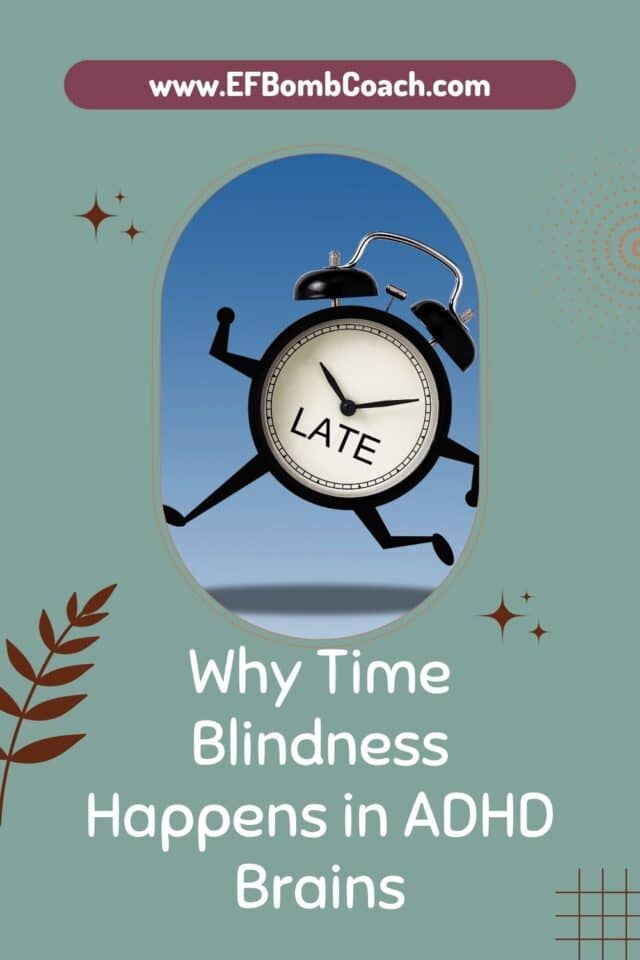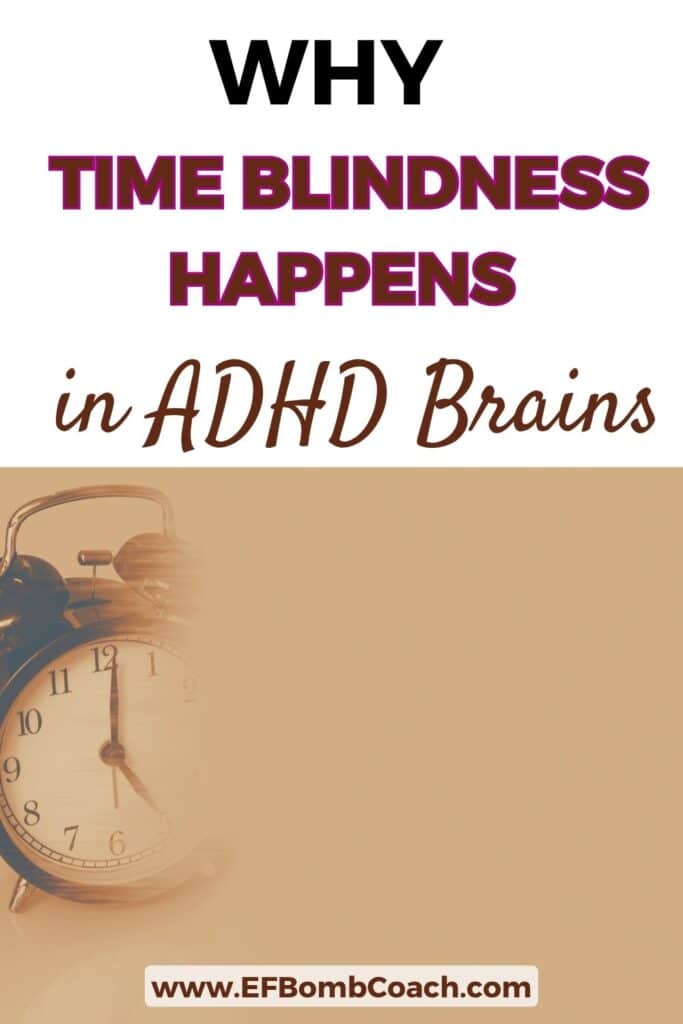Why Time Blindness Happens in ADHD Brains
If you have ADHD, you’re probably no stranger to time blindness, a real struggle where you lose track of time or can't sense how long things take. This isn’t about laziness or bad habits. It’s about how your brain works.
Prefer to listen rather than read? Press play below.
You might miss deadlines, run late, or feel overwhelmed by things piling up. These are everyday moments for many with ADHD, and they can make you feel defeated or frustrated.

What Is Time Blindness?
If you find yourself asking, “Where did the time go?” or you realize you’re late for something (again), you’re not alone. For many with ADHD, time doesn’t always feel like it ticks by in clear, steady chunks. Instead, it slips through your fingers, bending and stretching in ways that don’t match what the clock says. This slippery quality is called time blindness. It’s not just being bad at keeping schedules. It’s a real challenge that shapes how you move through day-to-day life.
Breaking Down Time Blindness
Time blindness happens when you can’t reliably sense the passage of time. It’s as if your internal clock runs off beat from the one on your phone. You aren’t ignoring time or choosing to be late. Instead, your brain reads time differently.
People with ADHD often have this trait because the parts of the brain responsible for time awareness and planning, like the prefrontal cortex, don't always fire the same way as they do for others.
Imagine watching TV and suddenly realizing three hours have vanished. Or you start a project thinking “this will just take me 10 minutes,” and then—surprise—it’s taken an hour, and you’re running behind on everything else.
How Time Blindness Shows Up in Daily Life
Everyone loses track of time now and then, but time blindness in ADHD shows up over and over, sometimes every day. Here’s how it might look:
- You’re late for appointments, even when you planned ahead.
- You start a task and hours go by before you look up.
- Deadlines sneak up on you, no matter how many reminders you set.
- You struggle to break bigger projects into smaller, timed steps.
- You often underestimate or overestimate how long things will take.
- You feel completely stuck when you have several things to manage at once.
It’s not just about being forgetful or careless. Most people with ADHD work really hard to stay on track. Yet, their brains just aren’t registering the flow of time the way others might expect.
The Difference Between Everyday Time Slips and Chronic Time Blindness
Everyone loses track of time now and again, especially when doing something fun or totally boring. So, what makes time blindness different?
For most people, minor slips happen now and then. Maybe you get distracted by your phone and end up late for dinner one night. But with time blindness, this isn’t an occasional mishap, it’s a consistent struggle.
Here’s what sets chronic time blindness apart:
- Frequency: It happens a lot, especially when you’re switching between tasks or trying to juggle routines.
- Impact: It disrupts school, work, friendships, and daily plans, not just once but over and over.
- Awareness: No amount of knowing you “should” pay attention fixes it—your sense of time just feels broken.
Understanding this distinction can help you see why simple advice like “set a timer” or “try harder” rarely works for someone with ADHD. It doesn't matter how much willpower or motivation you have. It’s a core trait linked to how your brain processes time
Recognizing time blindness is the first step to changing how you manage your days. You can find solutions, and you’re not broken or alone for struggling with this.

Want to learn more about executive functioning? Take my FREE course.
Why ADHD Brains Struggle With Time Perception
If you live with ADHD, the way you sense time probably feels unpredictable, slippery, or almost random. Hours can vanish when you’re interested in something, but minutes crawl unbearably during dull tasks.
There’s a real reason for that. ADHD impacts the brain systems that help you notice, track, and care about time. Let’s break down what’s going on under the hood and see how this shapes your experience of time.
Executive Function and Its Role in Time Management
Executive function is like your brain's personal assistant. Its job is to help you plan, organize, remember what’s important, and make sure things get done on schedule. For someone with ADHD, executive function runs on low battery or spotty Wi-Fi. This causes major headaches when it comes to managing time.
Deficits in executive function show up in a few big ways:
- Planning and sequencing: You start out sure you can finish something in 20 minutes, only to realize you forgot three other steps along the way.
- Prioritizing: Each to-do can feel equally urgent. Deciding what really matters in the moment is tough.
- Estimating time: It’s easy to convince yourself, “I have plenty of time,” even when you don’t—because your sense of how long tasks take is off.
Struggling with these skills means you often:
- Miss transitions between events or tasks.
- Forget about deadlines until they’re breathing down your neck.
- Bounce between projects, leaving some half-finished.
You aren’t lazy or careless. Your brain’s executive assistant is overwhelmed
Dopamine, Motivation, and Focus
Dopamine is one of the brain’s “feel-good” messengers. It’s also key to your ability to pay attention and care about what’s happening right now versus what happens later.
In ADHD brains, dopamine levels are often lower than average, making it much harder to stay motivated—especially when a reward feels far away.
When dopamine is out of balance, it can turn your sense of time into a funhouse mirror. Here’s what that might look like:
- You may crave instant rewards, finding it hard to start or finish anything less exciting.
- Boring tasks feel like they last forever, while engaging ones seem to eat up hours in minutes.
- Deadlines don’t send the right “alarm bells” until the pressure is sky-high.
This explains why you might jump from task to task or hyperfocus on something fun, only to crash and burn when it’s over. Your brain’s internal “urgency alarm” just isn’t wired the same.

The Challenge of Working Memory
Think of working memory as a mental sticky note you keep in your head. It’s what lets you remember short-term info, like “pick up milk later” or “my meeting is in ten minutes.” If you have ADHD, your sticky notes either disappear too fast or get lost under a pile of new ones.
Working memory issues can affect time in these ways:
- Difficulty tracking time: You lose track of where you are in a task, or forget how long you’ve been at it.
- Missing deadlines: Dates and times just don’t “stick,” making it easy for important details to vanish.
- Task switching: When you’re deep into something, you might forget what you were doing before, making transitions jarring.
When your working memory is stretched thin, it’s easy to underestimate how much time you need or forget to check the clock at all. Tasks run together or drop off your mental radar.
Science backs this up, too. People with ADHD often have measurable differences in working memory, which connects directly to how well they sense, remember, and use time.
All these wiring quirks can make time feel either too slow, too fast, or just unreliable. But understanding how ADHD affects your brain is a first step to finding what works for you.

The Real-Life Impact of Time Blindness for People With ADHD
When you hear the term “time blindness,” it might sound like a minor headache, maybe just a quirky habit of running late. The truth hits much harder for people with ADHD.
Time blindness can leave you feeling like you’re always playing catch-up, no matter how hard you try. It doesn’t just trip you up once in a while; it shapes your everyday life. Let’s look at what this actually feels like, how it can cause real problems at school, work, or at home, and why it often takes a toll on your emotions and relationships.
Everyday Scenarios Where Time Blindness Trips You Up
Life with time blindness can feel like a never-ending loop of “oops, I did it again.” It creeps into every corner of your life. Here are some situations that might hit close to home:
- You’re late for meetings even when you set alarms because you get sucked into a task or lose track of the clock.
- At school or work, you might rush assignments at the last second, not because you meant to procrastinate, but because you honestly lost track of when things were due.
- You miss family events or social plans. Friends and relatives might joke about your timetable, but deep down, it can hurt when people feel let down or stop depending on you.
Even simple plans, like “I’ll just take ten minutes to email” can snowball into half an hour, throwing off your whole day. When you finally surface and realize how late it is, you’re left scrambling—or worse, apologizing.
Time blindness isn’t just forgetfulness or poor organization. It’s something deeper. The issue is about how you experience and prioritize time. This disconnect affects not just schedules, but trust, confidence, and even self-worth.
Struggles at Work or School
If you crave a steady routine or want to shine at work, time blindness throws a wrench in the works. The challenges don’t stay hidden; they show up for everyone to see.
For example:
- You might start each day with a to-do list, but struggle to stick to it because you underestimate how long tasks take.
- Deadlines seem to appear out of nowhere, even when you plan ahead.
- Projects pile up, and you end up bouncing between them. That leads to unfinished work or last-minute scrambles.
Coworkers or teachers notice your pattern, too. They may see someone who’s disorganized or unreliable, not realizing your brain genuinely struggles with tracking time. The pressure builds. Sometimes, you might overcompensate, staying late or taking work home just to keep up.
Relationships and Social Conflict
Relationships run on trust and shared plans. When time blindness leaves you missing meetups, showing up late, or forgetting important dates, cracks can start to form.
Here’s how that can look:
- Friends get frustrated when they’re always waiting for you.
- Family members may think you don’t care because you’re always late or distracted.
- Partners might shoulder more of the planning, which can build resentment on both sides.
You might find yourself explaining, “It’s not personal, I just didn’t notice the time.” After a while, though, apologies start to wear thin. People can feel hurt, thinking they’re not a priority.
It’s not all bad news. Understanding what’s happening in your brain can help rebuild trust.

Did you know I have a membership for women who want to improve their executive function skills? Check it out here.
The Emotional Toll: Guilt, Frustration, and Stress
Everyone messes up occasionally. But when time blindness is your constant unwelcome sidekick, it’s easy to blame yourself—even when you’re trying your best. And, of course, that nasty little voice in your head loves to beat you up.
Here’s what this feels like for many:
- Guilt: You feel bad for missing out or letting others down, even if your intentions were good.
- Frustration: You get angry at yourself for repeating the same mistakes over and over.
- Stress: You’re always in catch-up mode, and that wears you down. Life can start to feel like a series of minor crises.
These feelings can eat away at your confidence and make it harder to try new tools or ask for help. Maybe you wonder, “Why can’t I just get it together?” or, “Will people ever believe I’m trying?”
Don’t let these negative feelings define you. Experts remind us that time blindness is a documented challenge for people with ADHD, not a failure of character.
Why Awareness Makes a Difference
When you start to recognize how time blindness shapes your habits, your relationships, and your feelings, you gain a new sense of control. You can stop blaming yourself, talk openly with others about your struggles, and focus on solutions.
The most important thing? You aren’t broken. With understanding and support, it’s possible to build better routines and even repair the trust that gets lost along the way.
Mindset Shifts and Self-Compassion: Rethinking the Way You See Yourself
Too often, time blindness leaves you feeling like you just need to “try harder” or “do better.” Here’s the truth: effort probably isn't your problem– you are trying– and you’re not alone in this struggle. Shifting how you talk to yourself can be just as important as any app or timer.
Try these mindset shifts:
- Acknowledge Brain Wiring: Remind yourself that ADHD shapes how you sense time. It’s not a weakness or failure, it’s a difference in brain function.
- Practice Self-Compassion: Talk to yourself like you’d talk to a friend in the same spot. Instead of, “I’m a mess,” try, “This is tough, but I’m learning new skills.” Practicing self-compassion can reduce anxiety and shame, making it easier to try again when you slip up.
- Challenge Negative Self-Talk: When you catch yourself blaming or shaming yourself, pause. Notice the thought, then rephrase it. “I’m always late” can become, “I’m working on showing up on time.”
- Recognize Progress, Not Perfection: Small wins deserve celebration. Each step toward better time management counts, even if it takes a few tries to get there.
You don’t need to fix everything overnight. Give yourself permission to experiment, mess up, and learn. There’s strength in asking for help when you need it, or in simply letting go of guilt when your brain doesn’t track time like everyone else’s.
Remember, every change starts with a shift in how you see yourself. Skills and systems matter, but the real secret is believing you’re worth the effort—messy afternoons and all.
You don’t have to fix everything at once. Small steps add up—one timer, one new routine, one shift in mindset. Trust that these changes matter, even when progress feels slow. Be kind to yourself on tough days, and remember, support and better tools can make a real difference.
Time blindness is part of the ADHD experience, but it doesn’t define you. You deserve support, and your progress counts.









